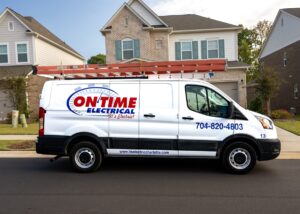 Electricity is something we depend on every day, but few of us think about how it works behind the scenes. Homes and businesses have electrical systems that deliver power to everything from light fixtures to large machines. However, the wiring in residential and commercial properties is not the same. Different environments require different electrical setups.
Electricity is something we depend on every day, but few of us think about how it works behind the scenes. Homes and businesses have electrical systems that deliver power to everything from light fixtures to large machines. However, the wiring in residential and commercial properties is not the same. Different environments require different electrical setups.
Let’s talk about some of differences between residential and commercial electrical wiring. Suppose you own a home or manage a business. In that case, knowing these differences can give you insight into how your building’s electrical system operates.
If you need professional electrical services in the Charlotte area, Dependaworthy On Time Electrical is ready to tackle both residential and commercial projects.
1. Electrical Wiring Material
One major difference between residential and commercial electrical wiring is the material used to protect the wires.
Residential Electrical Wiring
In your house, they’re usually covered in this plastic stuff called PVC. This is a practical choice because residential wiring is usually hidden away behind walls or up in the attic.
Once in place, it doesn’t need to be disturbed often, so the PVC provides enough protection from daily wear and tear.
Commercial Electrical Wiring
But office buildings or factories need something tougher. The wires are often in protective metal or hard plastic tubes. Why? Wiring in these settings is frequently exposed or subject to greater physical stress.
In busy commercial environments, people are always messing with the wiring. Think about adding new machines and moving stuff around. So, it must be easy to get to and tough enough to handle all that action.
2. Electrical Wiring Setup
Now, about how the whole system is set up. The way electrical wiring is organized differs between homes and commercial buildings.
Residential Electrical Wiring
Houses typically use a single-phase system, which delivers 120 volts to run household appliances and devices. This system is simple and gives enough juice for the lower energy demands of most homes. For example, run your lights, charge your phone, and keep your fridge cold.
Residential wiring is usually hidden from view. You want to have your home to look nice, right?
Commercial Electrical Wiring
But businesses? They need way more power. Commercial settings use a three-phase system, like the single-phase’s big brother. This setup involves two smaller legs carrying 120 volts each and a larger leg carrying 208 volts.
The design can handle all those larger equipment, such as industrial machines, commercial HVAC systems, and heavy-duty electronics without breaking a sweat.
Appearances are not a big deal in commercial environments. So, wiring is often visible and easy to access to allow for updates and fixes.
3. Phase Design & Load
If you wonder how much each system can handle, homes and businesses use different power phases and have varying electrical loads.
Residential Wiring
Your house doesn’t need that much electrical load. That’s why houses typically run on single-phase power, which provides 120 to 240 volts. This amount of power is sufficient for a typical home’s energy needs. Also, residential wiring requires less insulation and protection.
Commercial Wiring
In contrast, a factory or an enormous office building deals with some serious electricity. Businesses often run large machines, multiple computers, and industrial equipment, which require more energy than residential systems can provide.
Commercial buildings use three-phase systems to handle this increased demand, which distributes the load more evenly and prevents electrical problems. Commercial wiring needs heavier insulation on their wires, too, just to be safe. You don’t want any fires starting because of an overloaded circuit!
4. Backup Power Systems
Here’s something you might have yet to think about: what happens when the power goes out? Power outages affect homes and businesses differently, and their electrical systems reflect that.
Residential Wiring
Homes might have minimal backup power solutions. Maybe you’ve got a small generator for emergencies, such as keeping critical appliances running during outages.
But most homes don’t have extensive systems in place. Power loss at home is usually just a bummer rather than an emergency.
Commercial Wiring
On the other hand, power outages can be a nightmare for businesses. That’s why they often have big backup systems. Many companies rely on continuous operation, even in the event of an outage, to keep their machinery, computers, or HVAC systems running.
Commercial buildings often install large generators or uninterruptible power supplies (UPS) to avoid downtime. That can provide temporary power until the main system is restored.
5. Code and Safety Regulations
Both residential and commercial electrical wiring must follow electrical codes. But guess what? The requirements differ significantly.
Residential Wiring
Residential wiring is regulated by local, state, and national codes, which are in place to protect the safety of homeowners. These codes cover a range of factors, from the correct installation of outlets to the proper grounding of wires in areas like bathrooms or kitchens.
Commercial Wiring
The rules for commercial properties are way stricter and involve more safety measures. Makes sense when you think about it. A lot more could go wrong in a big building full of people and expensive equipment (larger electrical systems?).
This includes regulations for fire prevention, emergency lighting, and energy efficiency. Commercial electricians must be familiar with these regulations and conduct regular inspections to ensure compliance.
6. Customization vs. Standardization
Have you wondered how these electrical systems are designed? Homes and businesses approach electrical systems differently when it comes to customization.
Residential Electrical Wiring
In your house, it’s all about what you want. Homeowners often want their electrical systems to meet personal preferences.
Whether adding extra outlets in your home office or installing smart systems for lighting and climate control, residential wiring is typically designed with your needs (the homeowner) in mind. In other words, the layout and setup are customized to fit the specific use of your home.
Commercial Electrical Wiring
Big commercial buildings need everything to be standard. Uniform electrical systems allow large commercial properties to operate efficiently and safely.
By using standardized wiring setups, businesses make it easier to maintain, fix, and expand their electrical systems without causing a big mess. This helps create a safer and more manageable environment.
Commercial Electrical Wiring with Dependaworthy On Time Electrical
Residential and commercial electrical wiring may both deliver power, but the way they work is a world of difference. Each system is built to serve a specific purpose, from the materials used to the wiring setup. Homes rely on simpler, concealed systems that meet lower energy demands, while commercial properties use more accessible, high-capacity setups to handle complex electrical needs.
And if you’re in Charlotte and need some help with your commercial electrical wiring, Dependaworthy On Time Electrical is ready for the rescue. We bring the experience and know-how to manage the challenges of larger, more demanding electrical systems. We have a knack for commercial electrical projects that demand precision and reliability.
Our team handles all sorts of electrical work, and we’re pretty good at it. We stand behind our Dependaworthy (dependable + trustworthy) promise with a 100% satisfaction guarantee. Just look at our reviews and give us a call today!
